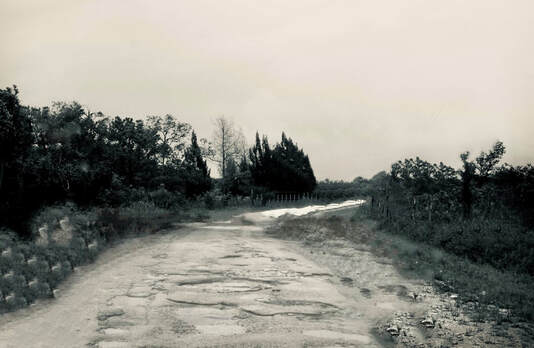Junglepixiebelize - Recollections of a Gringa Pioneer
Nancy R Koerner - Copyright@2021 - All Rights Reserved
|
CHAPTER TWO
"Old Northern Highway"
I had been wrong about the road. It wasn’t dirt, at least not anymore. Somewhere in the darkness, I couldn’t say exactly where, it had changed into tarmac. A ruin of broken scrabble-and-scree, but it was tarmac. Where exactly had we stopped alongside the road on the previous night? I would never really know. I can only say that whatever road this was, we had definitely bypassed Corozal, the northernmost town on my flimsy hand-drawn tracing-paper map.
|
First light was hazy, the road looking miserable. But then the skies cleared, and the sun burned through the mist. In that first daylight in Belize, my most profound impression was the beauty of the cohune palms. Up until now, I had only ever seen coconut palms, with their concentrated mostly at the top, creating a rounded crown. These fronds were elongated, the trees enormous. shafts of bright morning sunlight struck them harshly, but magnificently, all shiny green and black shadows. The fronds were up to sixty-feet long, curving gracefully from the crown of the tree all the way to the ground. I found out later that these were American Oil palms, their spate bearing large clusters of brown-oval nuts that, upon closer inspection, proved to be hard as stone.
At some point we must have gone fairly close to the sea, as I thought I saw the distant sparkle on the water for just a few minutes before the road curved inland again, but maybe that was the next day, closer to Belize City. My memories here are hazy. But it was shortly afterward that we began to smell the smell, and that I remember clearly. Yikes. We didn’t know it yet, but we were either now downwind of the sugar factory at Libertad, or downwind of the sugar factory at Tower Hill. Either way, this was the beginning of a stretch of desolation that would prove downright intolerable. The clouds returned.
Inversely proportional, as the morning breeze had died, the heat had risen. The stink of the sugar mill, wherever it was, choked us. With no air-conditioning, the windows of the old step-van had to stay open. We had no A/C, and the mosquitos were relentless. Voracious. I wiped the sweat off my baby son with a cotton diaper, and flapped it constantly to keep the swarming insects at bay. Nothing worked. Like a human smorgasbord, we were being eaten alive in a gang-bang of midge-bites. My son cried unceasingly. At last, my husband and I gave in to a collective-invective of harsh and pointless cursing. There was no relief. The van simply could not go any faster on his horrible road without the risk of falling apart, or breaking an axle.
What was this place? Where were we going? Was the whole country like this? Where was our refuge? What had we done by coming here? From the time we had left the northern U.S.A. — all the way through Mexico, and having survived the “night of total darkness” the night before on the Northern Highway — it was the most desperate moment of our nearly-three-thousand mile journey so far.
It was not the most desperate we would become...
At some point we must have gone fairly close to the sea, as I thought I saw the distant sparkle on the water for just a few minutes before the road curved inland again, but maybe that was the next day, closer to Belize City. My memories here are hazy. But it was shortly afterward that we began to smell the smell, and that I remember clearly. Yikes. We didn’t know it yet, but we were either now downwind of the sugar factory at Libertad, or downwind of the sugar factory at Tower Hill. Either way, this was the beginning of a stretch of desolation that would prove downright intolerable. The clouds returned.
Inversely proportional, as the morning breeze had died, the heat had risen. The stink of the sugar mill, wherever it was, choked us. With no air-conditioning, the windows of the old step-van had to stay open. We had no A/C, and the mosquitos were relentless. Voracious. I wiped the sweat off my baby son with a cotton diaper, and flapped it constantly to keep the swarming insects at bay. Nothing worked. Like a human smorgasbord, we were being eaten alive in a gang-bang of midge-bites. My son cried unceasingly. At last, my husband and I gave in to a collective-invective of harsh and pointless cursing. There was no relief. The van simply could not go any faster on his horrible road without the risk of falling apart, or breaking an axle.
What was this place? Where were we going? Was the whole country like this? Where was our refuge? What had we done by coming here? From the time we had left the northern U.S.A. — all the way through Mexico, and having survived the “night of total darkness” the night before on the Northern Highway — it was the most desperate moment of our nearly-three-thousand mile journey so far.
It was not the most desperate we would become...

